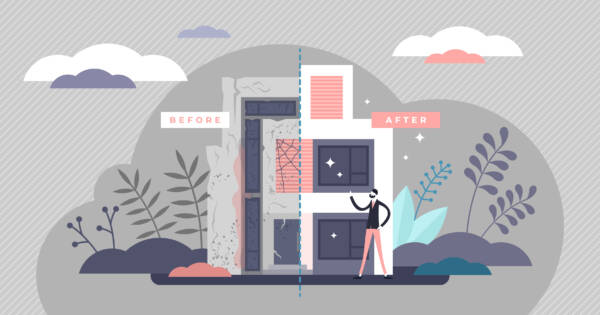Wages are low. Real estate prices are exploding. The economy remains stale (and unemployment is up) in the wake of a major global pandemic. For many millennials, the dream of owning their own home seems to be quickly fleeting. No matter what you do, it might seem like you’re never getting any closer to being able to buy a house. Maybe you’ve come to terms with just renting a place for the rest of your life. However, don’t believe all the doom and gloom. The world definitely looks a bit different than it used to. However, home ownership is still well within reach for many millennials. All it takes is a smart financial plan — along with some patience and discipline. These seven steps will help you get closer to that goal of buying a house.
1. Pay Down Debt (or Get Rid of It Altogether)
Debt represents one of the biggest obstacles to home ownership millennials face. For many, the debt cycle starts in young adulthood. The cost of college has spiraled out of control over the past couple of decades.
A CNBC report examined 20-year trends in higher education costs from 1987-to-88 to 2017-to-18. The inflation-adjusted results were shocking. Fees at four-year private universities soared by 229% over that timeframe. Public universities may charge less, but they became costlier at an even higher rate. During the 20-year study period, average tuition at public colleges ballooned by a whopping 313%.
Given these trends, it’s little wonder that many millennials left college with huge debt burdens. In 2021, CNBC conducted a poll of 1,000 millennials between the ages of 33 and 40. Respondents graduated from college with an average of $21,880 in student loan debt. Worse, 68% of poll participants were still paying off their college loans a decade-ish after graduation. Factor in the average millennial credit card balance of $4,712 and you’ve got some stiff financial challenges to overcome.
If you’re carrying debt, your first step in the journey to home ownership is to get it under control. Luckily, we have plenty of helpful advice ready for you.
- Reduce your credit card use. Or stop using credit altogether if you can (but don’t close out old accounts).
- Create a monthly budget that sets aside as much money as possible for debt payments.
- Carefully track all your spending. You might want to consider using a handy app.
- Maximize your monthly payments, targeting your highest-interest balances first.
- Consider refinancing or consolidating high-interest student loan and credit card debt.
Mortgages are a big financial responsibility. You don’t want to be saddled with a ton of other debt when you finally take one on.
2. Save, Save, Save
Getting out of debt is an essential first step. However, saving up a down payment is the next big hurdle you’ll need to clear. And it’s not a small hurdle at all. If you’re lucky, you’ll be able to tuck away a bit of money each month even as you pay off your loans and credit card balances. If not, don’t sweat it. Once your debt is under control, simply apply the same strategies you used to tackle it — but tuck the money away each month instead.
Many experts recommend saving enough money to put up a down payment of 20%. The bad news is that doing so takes an average of about 14 years. Owning a home is a powerful way to build wealth and mortgages are considered “good debt.” On the other hand, saving that down payment can be tough. Even coming up with just 10% (or even the minimum 3.5-to-5%, for some mortgage types) is better than not owning a home at all.
3. Target an Affordable Market
House prices are rising fast all across North America. Record low interest rates are a major driver of the real estate boom. Buyers and investors know low rates won’t last forever, and there are some signals that they may be going up soon. As such, people are scrambling to secure affordable mortgages while they can. This has created an unprecedented seller’s market.
First-time buyers need to prioritize affordability. That means you might not have the option to pick up and move to Paradise City (where the grass is green and housing prices are pretty). You may need a more realistic and targeted strategy to find a bargain in the area where you already live.
Here are some tips to consider.
- If you live and work in a major city, look to the suburbs for more affordable prices.
- Do some research to identify undervalued or redeveloping neighborhoods where housing prices are lower than average for the market.
- Think about purchasing a condo or semi-detached home. They are usually significantly cheaper and are a great way to get your foot in the door of the real estate market.
- Consider relocating to a more affordable location, especially if you live in a high-cost market but don’t have inflexible ties to it. For example, maybe the rise of Work From Home means you can move to a cheaper area without worrying about a lengthy commute.
4. Start Your House Hunt
Once you’ve found a housing market with attainable prices, start looking at specifics. Pay attention to exactly what you can get for the price you’ll pay, considering the following factors.
- Property type (detached home, semi-detached home, condominium).
- Number of bedrooms/bathrooms.
- Proximity of essential infrastructure (supermarkets, medical offices, schools, etc.).
This will give you a much clearer idea of the precise type of property within your reach. It’s always a good idea to know these things before you go ahead with the next step.
5. Partner With a Reputable Real Estate Professional
Working with a realtor or real estate agent is not an absolute requirement. However, it’s still highly recommended — especially for first-time buyers. These professionals have advanced market knowledge and insights that help clients avoid pitfalls and bad decisions.
However, it’s a very good idea to have a clear picture of the type of property you’re looking for before you approach a realtor or agent. Their job will also be much easier if you can give them the following information.
- Your minimum and maximum price range.
- The city district or neighborhood where you want to focus your search.
- The type and size of property you want.
- Essential property features you can’t live without (such as a home office, multiple bedrooms, or secure on-site parking, for example).
Gather referrals from friends and family members, but choose a real estate professional with specific expertise in your target market. Also, research the agent or broker beforehand to ensure their reputability.
6. Get Pre-Approved for a Mortgage
By this stage, you should be ready to make an offer if you find a property that matches your criteria. Getting mortgage pre-approval is the most efficient and secure way to achieve this.
Pre-approval means a bank or lender has already evaluated your financial situation. Then they informally clear you for a loan up to a certain dollar amount. You don’t actually take out a mortgage at this stage. Instead, pre-approval establishes an upper limit for the home you can afford. Then when you find a property valued at (or below) that limit, you go back to the lender and formalize the loan.
You can make the pre-approval process easier by following these steps and tips. Or read our more detailed article about how to get pre-approved for a mortgage.
- Gather the necessary documents: You’ll need proof of identity, income verification, documentation about your current debts, bank statements, and explanations of any assets you own.
- Know what you can afford: Use a mortgage calculator to come up with some hard numbers. In particular, consider your monthly payments: they need to be comfortably affordable on your current income.
- Shop around: Don’t limit yourself to just one bank. Consider competitors, even if you have been a customer of a particular financial institution for a long time. You may find a better deal somewhere else.
The process ends with the financial institution issuing a pre-qualification letter. This document communicates to the seller that you have financing in place. These letters are often vital to closing a deal, since the seller knows the whole thing is less likely to fall through if you have already been approved. Getting a pre-approved for a mortgage will make the whole process smoother.
7. Look Beyond Traditional Banks
Not that long ago, traditional banks and credit unions were pretty much the only institutions that offered mortgage loans to regular buyers. That has changed, thanks in large part to the evolution of the financial technology or “fintech” market.
In fact, increased use of fintech resources is one of the main ways millennials are changing the way real estate transactions work. Fintech has given rise to some of the following trends.
- Internet-based alternative lenders that offer more competitive interest rates and loan terms.
- Online quote aggregators and marketplaces, which group lenders together in competitive bidding environments.
- Advanced research and comparison tools that help consumers find the best possible deals.
Consumers have been the big beneficiaries of these advancements. Fintech alternatives make affordable mortgages more readily available to a broader cross-section of people. Ultimately, they particularly help younger, first-time buyers — a description that matches many millennials.
The Bottom Line
Cash-strapped millennials often feel their home ownership dreams are distant and unattainable. Yet, with time and some financial self-discipline, the goal is actually closer than it may seem. To recap, you need to go through the following steps:
- Get out of debt
- Save for a down payment
- Identify an affordable housing market
- Research properties
- Find a reputable real estate agent
- Get pre-approved for a mortgage
- Shop around with alternative lenders
Some of those steps are harder than others. Reducing your debt load and saving a down payment, for example, take a lot more work (and time) than browsing real estate listings or hitting some open houses on the weekend. However, don’t believe all the negativity surrounding that “millennials will never be able to buy a house” rhetoric. Yes, it’s a different financial landscape than previous generations faced. That doesn’t mean home ownership is an impossible task, though.
 Shutterstock
Shutterstock







